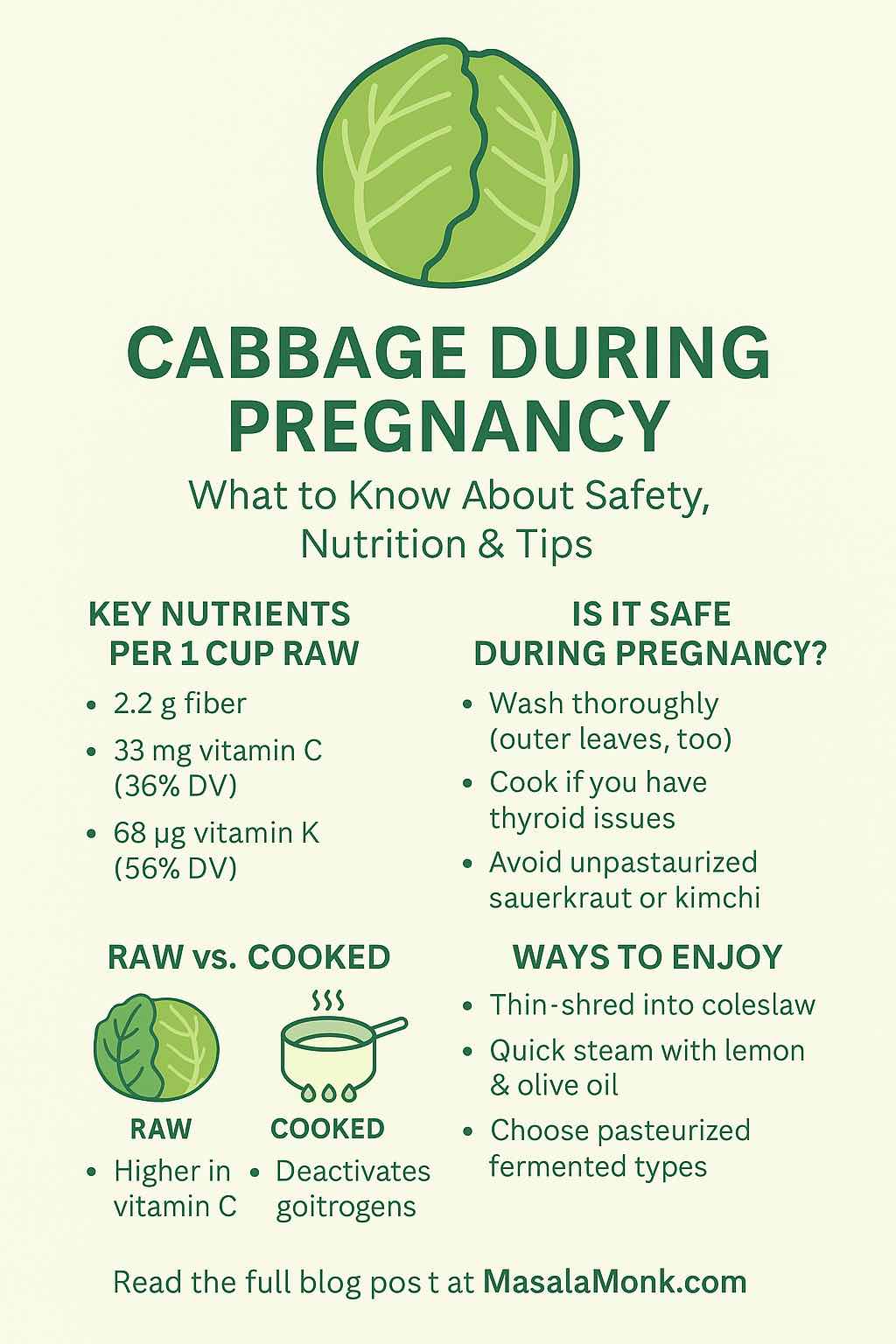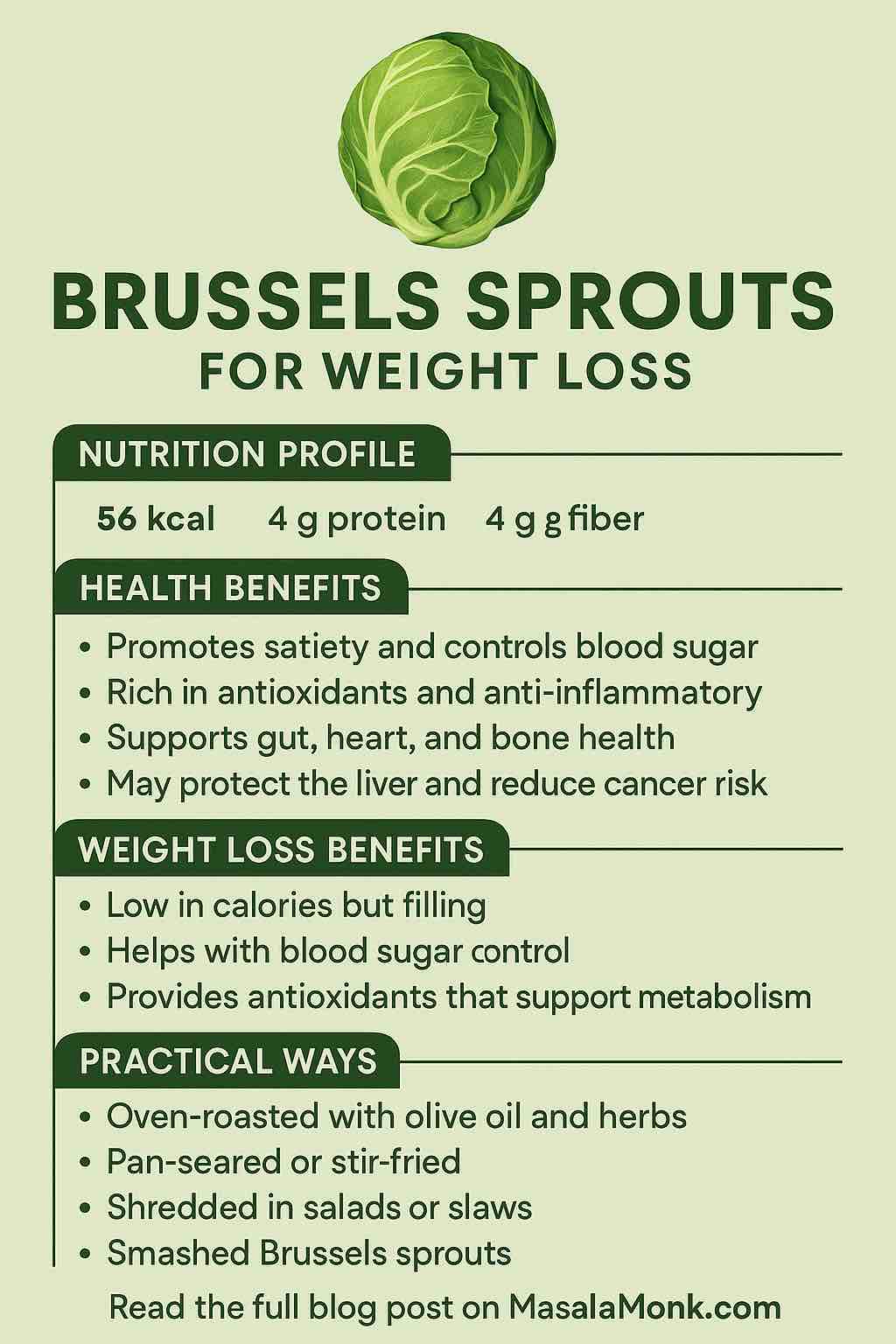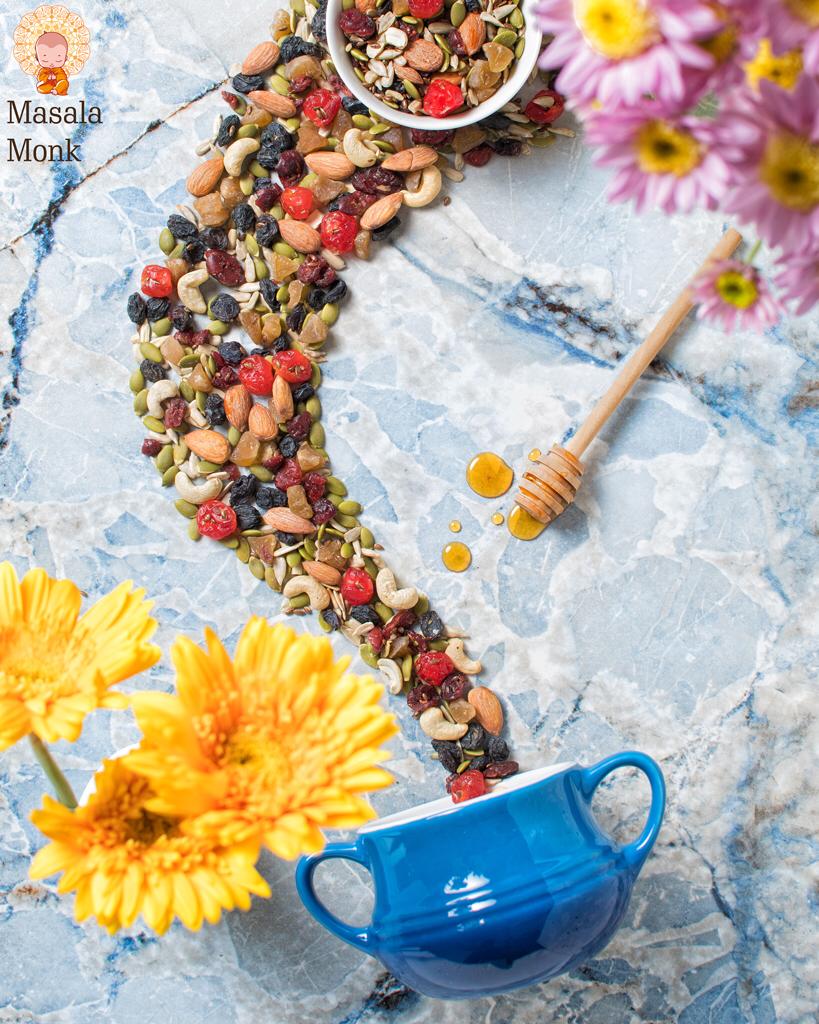
Pregnancy is a season when you start reading the back of every food packet, Googling the strangest questions (“Can I eat…?”), and discovering new produce in your shopping basket. Cabbage—whether green, red, Savoy, or Napa—may not be the first vegetable you think of, but it’s more than just a crunchy slaw ingredient.
Here, we’ll take a science-backed deep dive into cabbage during pregnancy—covering safety, nutrition, preparation tips, and practical ways to enjoy it. You’ll also find links to related posts for expanding your pregnancy nutrition toolkit.
🌱 Why Consider Cabbage in Pregnancy?
Cabbage is low in calories but rich in nutrients, making it an easy win for your pregnancy plate.
One cup raw cabbage (~89 g) provides:
- ~22 kcal
- 2.2 g fiber (supports digestion and satiety)
- 33 mg vitamin C (~36% of daily need) – aids immunity & helps your body absorb iron from plant foods
- ~68 µg vitamin K (~56% DV) – important for blood clotting and bone health
- Small amounts of folate, vitamin B6, and potassium
Pairing cabbage with folate-rich foods—like the ones in Boosting Folate in Pregnancy: Top 5 Lentil and Bean Dishes—can give you a nutrient-dense boost that supports your baby’s neural development.
✅ Is Cabbage Safe in Pregnancy?
Yes, cabbage is safe—as long as it’s handled properly.
Food safety checklist:
- Wash thoroughly under running water; peel away outer leaves.
- Dry well with a clean towel or salad spinner.
- Cook when in doubt—heat kills harmful bacteria like Listeria, which is more dangerous during pregnancy.
- Refrigerate promptly—Listeria can grow slowly even in the fridge.
For broader pregnancy-safe eating tips (and which foods to avoid), check our Safe Eating During Pregnancy guide.
🧪 Goitrogens & Thyroid Considerations
Cabbage is part of the cruciferous vegetable family, which also includes kale, broccoli, and Brussels sprouts. These vegetables contain glucosinolates, which can form compounds that interfere with iodine uptake in the thyroid (goitrogens).
- If your iodine intake is adequate (about 220–250 µg/day in pregnancy), moderate cabbage consumption is not a concern.
- If you have thyroid disease or low iodine intake, prefer cooked cabbage—heat inactivates most goitrogenic compounds.
- Use iodized salt and include iodine-rich foods like eggs, dairy, and certain fish.
You can explore crucifer cousins in our Kale During Pregnancy: Superfood for Supermoms post for more on this plant family.
🥬 Raw vs. Cooked vs. Fermented
| Form | Pros | Cons | Best For |
|---|---|---|---|
| Raw | High vitamin C, crisp texture | Slightly higher goitrogens; foodborne illness risk if not washed | Slaws, salads |
| Cooked | Safer; easier to digest; reduces goitrogens | Some vitamin C loss | Stir-fries, soups, steamed sides |
| Fermented (Sauerkraut, Kimchi) | Adds probiotics & flavor | Avoid unpasteurized; higher sodium | Pasteurized store-bought ferments |
Tip: Steaming cabbage for 3–5 minutes preserves more vitamin C than boiling and still reduces goitrogens.
⚠️ When to Be Cautious
- Unpasteurized ferments – Homemade sauerkraut/kimchi can carry bacteria harmful in pregnancy. Choose pasteurized versions.
- Digestive sensitivities – Cabbage is moderate-to-high in FODMAPs. If you have IBS, smaller servings (½–¾ cup) are gentler.
- Vitamin K & medications – Only relevant if you’re on warfarin, which is rarely used in pregnancy.
For pairing ideas that help balance digestion and nutrition, check out Chickpeas Through Pregnancy—legumes work beautifully with cabbage in soups, stews, and salads.
🍽 Practical Ways to Enjoy Cabbage in Pregnancy
Breakfast:
- Savory omelet with shredded cabbage, carrots, and scallions
- Side of steamed cabbage with olive oil and lemon
Lunch:
- Warm red cabbage and quinoa salad with feta (pasteurized) and orange segments
- Miso soup with Napa cabbage and tofu
Dinner:
- Stir-fried green cabbage with garlic, ginger, and lean chicken strips
- Roasted cabbage wedges with olive oil, iodized salt, and pepper
Snack/Side:
- Pasteurized sauerkraut on wholegrain toast with avocado
- Yogurt-based slaw with cabbage, apple, and mint (adds probiotics & calcium)
If you’re a salad fan, our 5 Folate-Rich Salads for Pregnant Women with Kale, Quinoa, and Beets offers creative ways to integrate cabbage’s crucifer cousins into your greens rotation.
📌 Key Takeaways
- Safe & nutrient-rich when washed well or cooked.
- Rich in vitamin C, fiber, and vitamin K, with bonus folate and antioxidants.
- Cook if thyroid concerns or to boost digestibility.
- Avoid unpasteurized ferments in pregnancy.
- Pair with protein & iodine-rich foods for a balanced meal.
Handled smartly, cabbage can be more than a filler—it can be a colorful, crunchy, and nourishing part of your pregnancy journey.
📝 FAQs: Cabbage During Pregnancy
1. Is cabbage safe to eat during pregnancy?
Yes, cabbage is safe when washed thoroughly or cooked. Avoid unpasteurized fermented cabbage to reduce the risk of foodborne illness.
2. Can I eat raw cabbage while pregnant?
Yes, if you wash it thoroughly under running water and remove outer leaves. Cooking is safer if you’re concerned about Listeria.
3. Does cabbage cause gas during pregnancy?
Cabbage contains FODMAPs, which can cause bloating or gas in some people. Smaller servings and cooked cabbage may be easier on digestion.
4. How does cabbage affect thyroid health in pregnancy?
Raw cabbage contains goitrogens, which may interfere with iodine uptake. If you have thyroid disease or low iodine intake, limit raw cabbage and prefer cooked forms.
5. Can I eat sauerkraut or kimchi during pregnancy?
Yes—if it’s pasteurized. Avoid homemade or unpasteurized ferments to prevent harmful bacteria exposure.
6. How much cabbage can I eat when pregnant?
1–2 cups raw or cooked a few times per week is a reasonable amount, alongside other vegetables for variety.
7. Does cooking cabbage destroy its nutrients?
Cooking reduces vitamin C but also lowers goitrogens and improves digestibility. Steaming for 3–5 minutes preserves more nutrients than boiling.
8. Is cabbage a good source of folate for pregnancy?
Cabbage contains some folate, but it’s not as high as leafy greens like spinach or legumes. Pair it with folate-rich foods such as lentils or chickpeas.
9. Can cabbage help with constipation during pregnancy?
Yes, its fiber content supports regular bowel movements, especially when combined with adequate fluids and other fiber-rich foods.
10. Which type of cabbage is best for pregnancy?
All varieties (green, red, Savoy, Napa) are nutritious. Red cabbage offers extra antioxidants (anthocyanins), while green varieties are milder in flavor.











